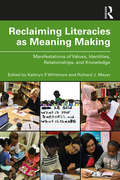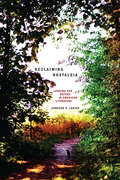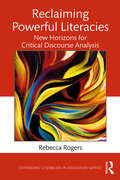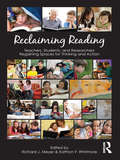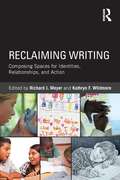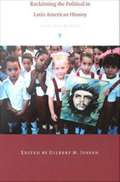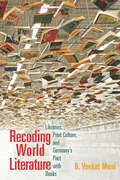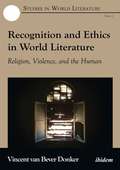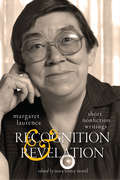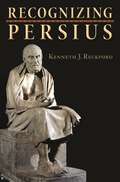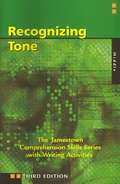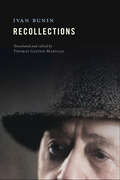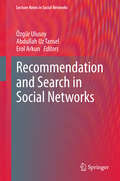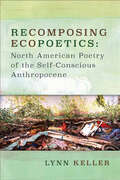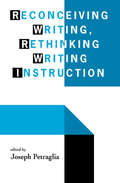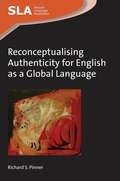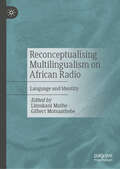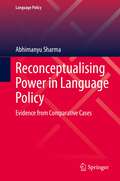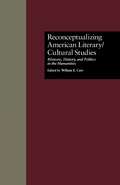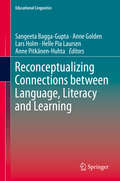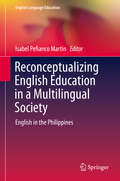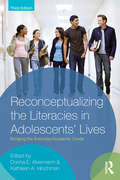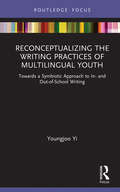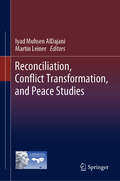- Table View
- List View
Reclaiming Literacies as Meaning Making: Manifestations of Values, Identities, Relationships, and Knowledge
by Kathryn F. WhitmoreWhitmore and Meyer bring together top literacy scholars from around the world to introduce the concept of manifestations: evidence of meaning making in literacy events, practices, processes, products, and thinking. Manifestation are windows into literacy identities, and serve as affective and sociocultural signifiers of learners’ understanding at a point in time and in a specific context. The volume reclaims progressive spaces for understanding reading, writing, drawing, speaking, playing, and other literacies. It grounds manifestations of literacies in the discourse of meaning making and demonstrates how literacy learners and educators are active agents in this complex, social, political, emotional, and multimodal process. Ideal for preservice teachers, graduate students, and researchers in literacy education, this book shifts the conversation away from treating literacies as acquired commodities and illustrates how educators engage with learners to deepen understanding of literacy learners’ experiences. Organized by five pillars of literacy—teaching, learning, language, curriculum, and sociocultural contexts—each section covers critical and cutting-edge topics and offers examples, tools, and strategies for research and practical applications in diverse classroom settings. Each chapter includes a range of examples and is followed by a short, complementary reading extension to engage the reader.
Reclaiming Nostalgia: Longing for Nature in American Literature (Under the Sign of Nature)
by Jennifer K. LadinoOften thought of as the quintessential home or the Eden from which humanity has fallen, the natural world has long been a popular object of nostalgic narratives. In Reclaiming Nostalgia, Jennifer Ladino assesses the ideological effects of this phenomenon by tracing its dominant forms in American literature and culture since the closing of the frontier in 1890. While referencing nostalgia for pastoral communities and for untamed and often violent frontiers, she also highlights the ways in which nostalgia for nature has served as a mechanism for social change, a model for ethical relationships, and a motivating force for social and environmental justice.
Reclaiming Powerful Literacies: New Horizons for Critical Discourse Analysis (Expanding Literacies in Education)
by Rebecca RogersOffering a unique, reflexive framework for Critical Discourse Analysis focused on discourses of hope, transformation, and liberation, this book showcases a variety of powerful literacies in action. Drawing from original research in a range of public, educational spaces across the lifespan—from Kindergartners studying social justice movements, to sixth graders designing a social justice museum exhibit focused on the environment and sustainability, to teacher education students practicing racial literacy in response to the death of Michael Brown in Ferguson, Missouri—Rogers makes the case that critical social theories often associated with Critical Discourse Analysis have not kept pace with a recent shift toward the positive, referred to as Positive Discourse Analysis. Encouraging readers to reconsider their understanding of concepts such as power, action, context, critique, and reflexivity, this book illustrates the potential of theorizing discourse analysis from a positive orientation.
Reclaiming Reading: Teachers, Students, and Researchers Regaining Spaces for Thinking and Action
by Richard Meyer Kathryn WhitmoreInviting teachers back to the role of reflective advocates for thoughtful reading instruction, this book presents theory and pedagogical possibilities to reclaim and build upon the knowledge base that was growing when government mandates, scripted commercial programs, and high stakes tests took over as the dominant agenda for reading instruction in U.S. public schools. Focusing on literacy learners’ and their teachers’ lives as literate souls, it examines how the teaching of reading can be reclaimed via an intensive reconsideration of five pillars as central to the teaching and learning of reading: learning, teaching, curriculum, language, and sociocultural contexts. Reclaiming Reading articulates the knowledge base that was marginalized or disrupted by legislated and policy intrusions into classrooms and provides practical examples for taking good reading instruction out of the cracks and moving it back to the center of the classroom. Explaining what happens in readers’ minds as they read and how teachers can design practices to support that process, this book encourages teachers to initiate pedagogy that will help them begin or return to the stance of reflective, knowledgeable, professional decision-makers.
Reclaiming Writing: Composing Spaces for Identities, Relationships, and Actions
by Kathryn F. Whitmore Richard J. MeyerWith passion, clarity, and rich examples, Reclaiming Writing is dedicated to reawakening the journeys that writers take as they make sense of, think about, and speak back to their worlds in this era of high-stakes testing and mandated curricula. Classrooms and out-of-school settings are described and analyzed in exciting and groundbreaking narratives that provide insights into the many possibilities for writing that support writers’ searches for voice, identity, and agency. Offering pedagogical strategies and the knowledge base in which they are grounded, the book looks at writing within various areas of the curriculum and across modes of writing from traditional text-based forums to digital formats. Thematically based sections present the pillars of the volume’s critical transactive theory: learning, teaching, curriculum, language, and sociocultural contexts. Each chapter is complemented by an extension that offers application possibilities for teachers in various settings. Reclaiming Writing emphasizes literacy as a vehicle for exploring, interrogating, challenging, finding self, talking back to power, creating a space in the world, reflecting upon the past, and thinking forward to a more joyful and democratic future.
Reclaiming the Author: Figures and Fictions from Spanish America
by Lucille KerrThe recent fiction of Spanish America has been widely acclaimed for its experimental and revolutionary qualities. In Reclaiming the Author, Lucille Kerr studies the sources of power of this newly emergent literature in her detailed examination of the critical concept of "the author." Kerr considers how Spanish American narratives raise questions about authorial identity and activity through the different figures of the author they propose. These author-figures, she maintains, both complement and contradict notions of authority that exist outside of the world of fiction.By focusing on works by well-known Spanish American authors--Cortazar, Donoso, Fuentes, Poniatowska, Puig, and Vargas Llosa--Kerr shows how the Spanish Americans have formed a radical poetics of the author. Her readings demonstrate how exemplary Spanish American texts, such as Rayuela, Terra nostra, and El hablador, call into question the author as a unitary or uniform, and therefore unproblematical, figure. Individually and together, Kerr's readings reclaim "the author" as a complex critical concept encompassing diverse, conflicting, even competitive roles.
Reclaiming the Political in Latin American History: Essays from the North
by Gilbert M. JosephReclaiming the Political in Latin American History is a collection that embraces a new social and cultural history of Latin America that is not divorced from politics and other arenas of power. True to the intellectual vision of Brazilian historian Emilia Viotti da Costa, one of Latin America's most distinguished scholars, the contributors actively revisit the political--as both a theme of historical analysis and a stance for historical practice--to investigate the ways in which power, agency, and Latin American identity have been transformed over the past few decades. Taking careful stock of the state of historical writing on Latin America, the volume delineates current historiographical frontiers and suggests a series of new approaches that focus on several pivotal themes: the construction of historical narratives and memory; the articulation of class, race, gender, sexuality, and generation; and the historian's involvement in the making of history. Although the book represents a view of the Latin American political that comes primarily from the North, the influence of Viotti da Costa powerfully marks the contributors' engagement with Latin America's past. Featuring a keynote essay by Viotti da Costa herself, the volume's lively North-South encounter embodies incipient trends of hemispheric intellectual convergence. Contributors. Jeffrey L. Gould, Greg Grandin, Daniel James, Gilbert M. Joseph, Thomas Miller Klubock, Mary Ann Mahony, Florencia E. Mallon, Diana Paton, Steve J. Stern, Heidi Tinsman, Emilia Viotti da Costa, Barbara Weinstein
Recoding World Literature: Libraries, Print Culture, and Germany's Pact with Books
by B. Venkat ManiWinner, 2018 Aldo and Jeanne Scaglione Prize for Studies in Germanic Languages and Literatures, Modern Language AssociationWinner, 2018 German Studies Association DAAD Book Prize in Germanistik and Cultural Studies.From the current vantage point of the transformation of books and libraries, B. Venkat Mani presents a historical account of world literature. By locating translation, publication, and circulation along routes of “bibliomigrancy”—the physical and virtual movement of books—Mani narrates how world literature is coded and recoded as literary works find new homes on faraway bookshelves. Mani argues that the proliferation of world literature in a society is the function of a nation’s relationship with print culture—a Faustian pact with books. Moving from early Orientalist collections, to the Nazi magazine Weltliteratur, to the European Digital Library, Mani reveals the political foundations for a history of world literature that is at once a philosophical ideal, a process of exchange, a mode of reading, and a system of classification.Shifting current scholarship’s focus from the academic to the general reader, from the university to the public sphere, Recoding World Literature argues that world literature is culturally determined, historically conditioned, and politically charged.
Recognition and Ethics in World Literature: Religion, Violence, and the Human (Studies In World Literature Ser. #2)
by Vincent van Bever DonkerRecognition and Ethics in World Literature is a critical comparative study of contemporary world literature, focusing on the importance of the ethical turn (or return) in literary theory. The book examines the ethical engagement of novels by Amitav Ghosh, Chimamanda Adichie, Caryl Phillips, Kazuo Ishiguro, Zadie Smith, and J. M. Coetzee, exploring the overlap and divergence between Levinasian/Derridean and Aristotelian ethics. Recognitions and emotional responses are integral to the unfolding of ethical concerns, and the ethics they explore are often marked by the complexity and impurity characteristic of the tragic. Recognition is particularly suitable for the concerns of world literature authors in its interconnection of the universal and the particular-a binary that has been crucial in postcolonialism and remains important for the wider field of world literature. This study builds its analysis around three broad themes: religion, the memory of violence, and the human.
Recognition and Revelation: Short Nonfiction Writings (Carleton Library Series #251)
by Margaret LaurenceMargaret Laurence, best known for her germinal novels set in the Canadian prairies, is one of the nation's most respected authors. She was also an accomplished essayist, yet today her nonfiction writing is largely unavailable and therefore little known. In Recognition and Revelation Nora Foster Stovel brings together Laurence's short nonfiction works, including many that have not previously been collected and some that have never before been published. These works, including over fifty essays and addresses that span Laurence's writing career from the 1960s to the 1980s, reveal her passionate concern for Canadian literature and for the land and peoples of Canada. Based on extensive archival research, Stovel's introduction contextualizes Laurence's nonfiction writings in her life as a creative artist and political activist and as a woman writing in the twentieth century. The texts range from essays on Laurence's own writings and on other works of Canadian literature to autobiographical essays, several focusing on environmental concerns, to sociopolitical essays and writing advocating for peace and nuclear disarmament. By revealing Laurence as a socially and politically committed artist, this collection of lively and provocative essays illuminates the undercurrents of her creative writing and places her fiction - often informed by her nonfiction writing - in a new light.
Recognizing Persius (Martin Classical Lectures #23)
by Kenneth J. ReckfordRecognizing Persius is a passionate and in-depth exploration of the libellus--or little book--of six Latin satires left by the Roman satirical writer Persius when he died in AD 62 at the age of twenty-seven. In this comprehensive and reflectively personal book, Kenneth Reckford fleshes out the primary importance of this mysterious and idiosyncratic writer. Reckford emphasizes the dramatic power and excitement of Persius's satires--works that normally would have been recited before a reclining, feasting audience. In highlighting the satires' remarkable honesty, Reckford shows how Persius converted Roman satire into a vehicle of self-exploration and self-challenge that remains relevant to readers today. The book explores the foundations of Roman satire as a performance genre: from the dinner-party recitals of Lucilius, the founder of the genre, through Horace, to Persius's more intense and inward dramatic monologues. Reckford argues that despite satire's significant public function, Persius wrote his pieces first and mainly for himself. Reckford also provides the context for Persius's life and work: his social responsibilities as a landowner; the interplay between his life, his Stoic philosophy, and his art; and finally, his incomplete struggle to become an honest and decent human being. Bringing the modern reader to a closer and more nuanced acquaintance with Persius's work, Recognizing Persius reinstates him to the ranks of the first-rate satirists, alongside Horace and Juvenal.
Recognizing Tone: The Jamestown Comprehension Skills Series with Writing Activities, Third Edition
by Jamestown PublishersThe Comprehension Skills Series teaches students to become stronger, efficient readers by developing ten important, specific reading comprehension skills.
Recollections (NIU Series in Slavic, East European, and Eurasian Studies)
by Ivan BuninIn this edited translation of famed writer Ivan Bunin's Recollections translator Thomas Gaiton Marullo provides an intimate look at leading political, social, cultural, and literary figures from late imperial Russia, through the First World War and the revolutions of 1905 and 1917 to the birth of the Russian diaspora and the rise of the Soviet state. Through engaging, colorful, and often idiosyncratic vignettes, Bunin (1870–1953) details his admiration for Leo Tolstoy, Anton Chekhov, Sergei Rachmaninov, and Fyodor Chaliapin. He shares his love-hate relationships with Maxim Gorky, Alexei Tolstoy, and Alexander Kuprin. In addition, Marullo's translation reveals Bunin's hatred of avant-gardists, particularly Vladimir Mayakovsky, as well as his thoughts and experiences on war, revolution, and exile. Bunin's work led, in the end, to his bittersweet reception of the Nobel Prize in Literature (1933) in Stockholm, making him the first Russian and the first writer in exile ever to receive this award. Recollections reveals the author's feelings toward this unprecedented event. Bunin's Recollections stands not only as a stark summa of his passage through literature and life but also as an equally bold apologia as to his place in both.
Recommendation and Search in Social Networks
by Özgür Ulusoy Abdullah Uz Tansel Erol ArkunThis edited volume offers a clear in-depth overview of research covering a variety of issues in social search and recommendation systems. Within the broader context of social network analysis it focuses on important and up-coming topics such as real-time event data collection, frequent-sharing pattern mining, improvement of computer-mediated communication, social tagging information, search system personalization, new detection mechanisms for the identification of online user groups, and many more. The twelve contributed chapters are extended versions of conference papers as well as completely new invited chapters in the field of social search and recommendation systems. This first-of-its kind survey of current methods will be of interest to researchers from both academia and industry working in the field of social networks.
Recomposing Ecopoetics: North American Poetry of the Self-Conscious Anthropocene (Under the Sign of Nature)
by Lynn KellerIn the first book devoted exclusively to the ecopoetics of the twenty-first century, Lynn Keller examines poetry of what she terms the "self-conscious Anthropocene," a period in which there is widespread awareness of the scale and severity of human effects on the planet. Recomposing Ecopoetics analyzes work written since the year 2000 by thirteen North American poets--including Evelyn Reilly, Juliana Spahr, Ed Roberson, and Jena Osman--all of whom push the bounds of literary convention as they seek forms and language adequate to complex environmental problems. Drawing as often on linguistic experimentalism as on traditional literary resources, these poets respond to environments transformed by people and take "nature" to be a far more inclusive and culturally imbricated category than conventional nature poetry does. This interdisciplinary study not only brings cutting-edge work in ecocriticism to bear on a diverse archive of contemporary environmental poetry; it also offers the environmental humanities new ways to understand the cultural and affective dimensions of the Anthropocene.
Reconceiving Writing, Rethinking Writing Instruction
by Joseph PetragliaTo a degree unknown in practically any other discipline, the pedagogical space afforded composition is the institutional engine that makes possible all other theoretical and research efforts in the field of rhetoric and writing. But composition has recently come under attack from many within the field as fundamentally misguided. Some of these critics have been labelled "New Abolitionists" for their insistence that compulsory first-year writing should be abandoned. Not limiting itself to first-year writing courses, this book extends and modifies calls for abolition by taking a closer look at current theoretical and empirical understandings of what contributors call "general writing skills instruction" (GWSI): the curriculum which an overwhelming majority of writing instructors is paid to teach, that practically every composition textbook is written to support, and the instruction for which English departments are given resources to deliver. The vulnerability of GWSI is hardly a secret among writing professionals and its intellectual fragility has been felt for years and manifested in several ways: * in persistently low status of composition as a study both within and outside of English departments; * in professional journal articles and conference presentations that are growing both in theoretical sophistication and irrelevance to the composition classroom; and * in the rhetoric and writing field's ever-increasing attention to nontraditional sites of writing behavior. But, to date, there has been relatively little concerted discussion within the writing field that focuses specifically on the fundamentally awkward relationship of writing theory and writing instruction. This volume is the first to explicitly focus on the gap in the theory and practice that has emerged as a result of the field's growing professionalization. The essays anthologized offer critiques of GWSI in light of the discipline's growing understanding of the contexts for writing and their rhetorical nature. Writing from a wide range of cognitivist, critical-theoretical, historical, linguistic and philosophical perspectives, contributors call into serious question basic tenets of contemporary writing instruction and provide a forum for articulating a sort of zeitgeist that seems to permeate many writing conferences, but which has, until recently, not found a voice or a name.
Reconceptualising Authenticity for English as a Global Language
by Richard S. PinnerThis book examines the concept of authentic English in today's world, where cultures are in constant interaction and the English language works as a binding agent for many cross-cultural exchanges. It offers a comprehensive review of decades of debate around authenticity in language teaching and learning and attempts to synthesise the complexities by presenting them as a continuum. This continuum builds on the work of eminent scholars and combines them within a flexible framework that celebrates the process of interaction whilst acknowledging the complexity and individual subjectivity of authenticity. Authenticity is approached as a complex dynamic construct that can only be understood by examining it from social, individual and contextual dimensions, in relation to actual people. Authenticity is a problem not just for language acquisition but one which affects us as individuals belonging to society.
Reconceptualising Multilingualism on African Radio: Language and Identity
by Gilbert Motsaathebe Limukani MatheThis book redefines multilingualism via the concept of radio in Africa. Africa presents unique challenges of lingual diversity which the media still struggles to accommodate, particularly when it comes to indigenous languages. Contributors argue that the linguistic realities of African radio reflect ethnic co-existence and fluidity of identity in pre-colonial, colonial and post-colonial contexts. They argue that communities consist of several “majorized” and “minoritized” indigenous languages which, if closely analysed, reflect a commonality of multilingualism. The book also suggests practical measures through which linguistic co-existence could be achieved and explores cases that redefine, reconceptualize and reframe multilingualism on African radio.
Reconceptualising Power in Language Policy: Evidence from Comparative Cases (Language Policy #30)
by Abhimanyu SharmaThis book aims to expand the theoretical framework of and counter the Eurocentric narratives in language policy research, by comparing policies of EU and India and demonstrating the importance of taking a comparative perspective while studying language policies. This book challenges the notion of macro-level power in language policy research and offers evidence that, in democratic frameworks, macro-level power is not absolute. It is not uniform across policy domains, but rather susceptible to pressure, especially in the domains of healthcare and social welfare.This book makes three important contributions to the theory of language policy by:Arguing for the need to reconceptualise macro-level powerProposing ‘Categories of Differentiation’ as a new analytical tool for policy researchDemonstrating that socio-political changes are reflected at the textual level This book is of interest to researchers working on language policies and those investigating language related legislation across different policy domains, to practitioners and policymakers in language policy, as well as to graduate students conducting comparative policy research.“This is a much valued and timely book making a strong case for the subject of language policy across Europe and India. The large comparative case studies of four distinctive states across Europe and India in a simple descriptive mode makes the reading of this book enjoyable. The domains of administration, legislation, healthcare and social welfare are undoubtedly novel ways to deal within the concept of language policy in a wider sense. The author uses discourse analysis to bring out the relationship between intention, explanation and interpretation of a phenomenon like language policy and its implementation. The social diversity as expressed in linguistic mapping is well captured in the novel idea of “categories of differentiation” both as a normative methodological tool and its historical-empirical manifestation.” — Asha Sarangi, Jawaharlal Nehru University, New Delhi.
Reconceptualizing American Literary/Cultural Studies: Rhetoric, History, and Politics in the Humanities (Wellesley Studies in Critical Theory, Literary History and Culture #12)
by William E. CainFirst published in 1996. Routledge is an imprint of Taylor & Francis, an informa company.
Reconceptualizing Connections between Language, Literacy and Learning (Educational Linguistics #39)
by Lars Holm Anne Pitkänen-Huhta Sangeeta Bagga-Gupta Anne Golden Helle Pia LaursenThis edited volume unpacks the familiar concepts of language, literacy and learning, and promotes dialogue and bridge building within and across these concepts. Its specific interest lies in bridging the gap between Literacy Studies (or New Literacy Studies), on the one hand, and SLA and scholarship in learning in multilingual contexts, on the other. The chapters in the volume center-stage empirical analysis, and each addresses gaps in the scholarship between the two domains. The volume addresses the need to engage with the concepts, categorizations and boundaries that pertain to language, literacy and learning. This need is especially felt in our globalized society, which is characterized by constant, fast and unpredictable mobility of people, goods, ideas and values. The editors of this volume are founding members of the Nordic Network LLL (Language, Literacy and Learning). They have initiated a string of workshops and have discussed this theme at Nordic meetings and at symposia at international conferences.
Reconceptualizing English Education in a Multilingual Society
by Isabel Pefianco MartinThis book brings together chapters that describe, investigate, and analyze the place of English in education in multilingual Philippines. Unlike most studies on languages in education, which take a neutral, de-contextualized stance, this volume take a pluricentric view of the English language by positioning it in relation to its varieties, as well as to other languages in the country. Because of the changing realities of English in the Philippines, traditional assumptions about the language as monolithic and unchanging, as well as about how it should be taught and learned, need to be revisited and re-conceptualized.
Reconceptualizing the Literacies in Adolescents' Lives: Bridging the Everyday/Academic Divide, Third Edition
by Kathleen A. Hinchman Donna E. AlvermannLike previous editions, the third edition of Reconceptualizing the Literacies in Adolescents’ Lives invites middle- and high-school educators to move toward a broad, generative view of adolescent literacies. Recognizing that digital media, social networking phenomena are now central in adolescents’ lives, what is different is the focus in this edition on bridging students’ everyday literacies and subject matter learning. Four chapters from earlier editions serve as touchstone texts, honoring youth’s diverse experiences and illustrating how young people’s literacies are enacted, situated, and mediated in various locales; nine new chapters consider how these themes are lived in today’s schools and in the rapidly changing world outside of school This edition features heightened attention multimodal meaning construction, more discussion of practical implications of the ideas presented, and co-authored teacher commentaries at the end of each section. A Companion Website, new for this edition, facilitates practical application of the text’s key ideas, with discussion questions, and links to instructional activities, blogs, additional readings and viewings, and interactive web pages, and videos.
Reconceptualizing the Writing Practices of Multilingual Youth: Towards a Symbiotic Approach to In- and Out-of-School Writing (Routledge Research in Literacy Education)
by Youngjoo YiFocusing on adolescent multilingual writing, this text problematizes the traditional boundaries between academic writing in school contexts and self-initiated writing outside of the formal learning environment. By reconceptualizing the nature of adolescent multilingual writing, the author establishes it as an interdisciplinary genre and a key area of inquiry for research and pedagogy. Organized into six chapters, Reconceptualizing the Writing Practices of Multilingual Youth provides an in-depth examination of the writing practices of multilingual youth from sociocultural and social practice perspectives. Drawing on first-hand research conducted with young people, the text questions the traditional dichotomy between academic writing and non-formal equivalents and proposes a symbiotic approach to exploring and cultivating the connections between in- and out-of-school literate lives. By highlighting a bidirectional relationship between formal and informal writing, the text advocates for writing instruction that helps adolescents use writing for entertainment, identity construction, creative expression, personal well-being, and civic engagement, as well as helps them learn to navigate future literacies that we cannot imagine or predict now. This much-needed text will provide researchers and graduate students with a principled overview and synthesis of adolescent multilingual writing research that is significant yet underexplored in applied linguistics, TESOL, and literacy studies.
Reconciliation, Conflict Transformation, and Peace Studies
by Martin Leiner Iyad Muhsen AlDajaniThis book, achieved in cooperation with the Academic Alliance for Reconciliation Studies in the Middle East and North Africa (AARMENA), focuses on peacebuilding, conflict transformation, and shifts toward approaching the reconciliation process as an inter-, trans- and multidisciplinary field. The research presented in the series focuses on the Middle East and North Africa, highlighting contributions by practitioners and scholars alike.The book is divided into five sections:Sections 1: Theoretical and Philosophical FrameworkSection 2: Digital Humanities on Reconciliation, Conflict Transformation, and Peace StudiesSection 3: Research Science on Reconciliation, Conflict Transformation, and Peace StudiesSection 4: Practices of Studies on Reconciliation, Conflict Transformation, and Peace StudiesSection 5: Cases Studies on Reconciliation, Conflict Transformation, and Peace StudiesThe book's first part focuses on theories and the philosophical framework for the research on reconciliation, conflict transformation, and peace studies. The second part of the book is dedicated to digital humanities development in the reconciliation and peace education field, its impact on the reconciliation process in societies, and the introduction of Artificial Intelligence in analysis techniques to differentiate and identify research in different domains. The book's third part is dedicated to the research on reconciliation and conflict transformation in different disciplines. The fourth part concentrates on the practices in the field, and the fifth part illustrates case studies on reconciliation, conflict transformation, and peace studies. The target audience is professors, scholars, practitioners, students, and scientists that are experts in the field of Middle East and North Africa.
